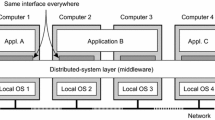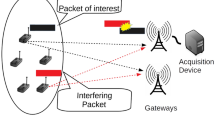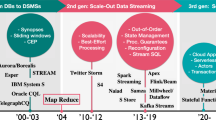Abstract
Fair queueing in the wireless domain poses significant challenges due to unique issues in the wireless channel such as location-dependent and bursty channel errors. In this paper, we present a wireless fair service model that captures the scheduling requirements of wireless scheduling algorithms, and present a unified wireless fair queueing architecture in which scheduling algorithms can be designed to achieve wireless fair service. We map seven recently proposed wireless fair scheduling algorithms to the unified architecture, and compare their properties through simulation and analysis. We conclude that some of these algorithms achieve the properties of wireless fair service including short-term and long-term fairness, short-term and long-term throughput bounds, and tight delay bounds for channel access.
Similar content being viewed by others
References
J.C.R. Bennett and H. Zhang, WF 2 Q: Worst-case fair weighted fair queueing, in: IEEE INFOCOM'96 (March 1996).
P. Bhagwat, P. Bhattacharya, A. Krishma and S. Tripathi, Enhancing throughput over wireless LANs using channel state dependent packet scheduling, in: IEEE INFOCOM'96 (April 1996).
A. Demers, S. Keshav and S. Shenker, Analysis and simulation of a fair queueing algorithm, in: ACM SIGCOMM'89 (August 1989).
P. Goyal, H.M. Vin and H. Chen, Start-time Fair Queueing: A scheduling algorithm for integrated service access, in: ACM SIGCOMM'96 (August 1996).
S.J. Golestani, A self-clocked fair queueing scheme for broadband applications, in: IEEE INFOCOM'94 (April 1994).
S. Lu, V. Bharghavan and R. Srikant, Fair scheduling in wireless packet networks, in: ACM SIGCOMM'97 (August 1997).
M. Srivastava, C. Fragouli and V. Sivaraman, Controlled multimedia wireless link sharing via enhanced class-based queueing with channel-state-dependent packet scheduling, in: IEEE INFOCOM'98 (March 1998).
T.S. Ng, I. Stoica and H. Zhang, Packet fair queueing algorithms for wireless networks with location-dependent errors, in: IEEE INFOCOM'98 (March 1998).
P. Ramanathan and P. Agrawal, Adapting packet fair queueing algorithms to wireless networks, in: ACM MOBICOM'98 (October 1998).
S. Lu, T. Nandagopal and V. Bharghavan, Fair scheduling in wireless packet networks, in: ACM MOBICOM'98 (October 1997).
D. Eckhardt and P. Steenkiste, Improving wireless LAN performance via adaptive local error control, in: IEEE ICNP'98, Austin (October 1998).
E.O. Elliot, Estimates of error rates for codes on burst-noise channels, Bell Systems Technical Journal 42 (September 1963) 1977–1997.
A. Parekh, A generalized processor sharing approach to flow control in integrated services networks, PhD thesis, MIT Laboratory for Information and Decision Systems, Technical report LIDS-TR-2089 (1992).
S. Floyd and V. Jacobson, Link-sharing and resource management models for packet networks, IEEE/ACM Transactions on Networking 3(4) (August 1995) 365–386.
Author information
Authors and Affiliations
Rights and permissions
About this article
Cite this article
Nandagopal, T., Lu, S. & Bharghavan, V. A Unified Architecture for the Design and Evaluation of Wireless Fair Queueing Algorithms. Wireless Networks 8, 231–247 (2002). https://doi.org/10.1023/A:1013724109843
Issue Date:
DOI: https://doi.org/10.1023/A:1013724109843




